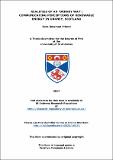Files in this item
Realities of an 'Orkney way' : communicating perceptions of renewable energy in Orkney, Scotland
Item metadata
| dc.contributor.advisor | Harris, Mark | |
| dc.contributor.advisor | Rapport, Nigel | |
| dc.contributor.author | Friend, Sara | |
| dc.coverage.spatial | xi, 207 p. | en_US |
| dc.date.accessioned | 2017-03-15T14:15:32Z | |
| dc.date.available | 2017-03-15T14:15:32Z | |
| dc.date.issued | 2017-06-22 | |
| dc.identifier | uk.bl.ethos.707264 | |
| dc.identifier.uri | https://hdl.handle.net/10023/10471 | |
| dc.description.abstract | Orkney is currently home to over 400 wind turbines and a growing marine energy industry, developing cutting edge technology for what could be called a global energy transition. Situated off the north tip of the Scottish mainland, the archipelago is also home to a long-standing local population of just over 21,000 inhabitants. In fact, habitation in these islands stretches back over 5,000 years, a connection expressed by the local population. This thesis rests at the intersection of these two points of interest: energy and locality. Drawing from ethnographic fieldwork conducted between October 2013 and October 2014, this thesis analyses the communication of perceptions of renewable energy in the archipelago. It takes into consideration the specificity of one particular network of relations: the individuals employed or otherwise involved in the development and production of this energy while situating the specificity of these perceptions within the larger body of residents. Here, collective history, the importance of place, and maintenance of identity are intimately tied up in the range of perspectives present, as well as within the very promotion of the industry. The relationship between individual perception and collective affirmation, the existence of multiple spheres of realities, the simplification of realities in the communication meaning, and the relationship between nodes of interaction are all analysed. While far from a constantly discussed occurrence, the presence of renewable energy in Orkney has provided residents with a mobilising force, an impetus for discussions of the self, of identity and belonging, of the importance of place, and of the relationship between the past, present and future. | en_US |
| dc.language.iso | en | en_US |
| dc.publisher | University of St Andrews | |
| dc.rights | Attribution-NonCommercial-NoDerivatives 4.0 International | * |
| dc.rights.uri | http://creativecommons.org/licenses/by-nc-nd/4.0/ | * |
| dc.subject | Anthropology of energy | en_US |
| dc.subject | Identity | en_US |
| dc.subject | Myth | en_US |
| dc.subject | Community | en_US |
| dc.subject | Renewable energy | en_US |
| dc.subject | Realities | en_US |
| dc.subject | Orkney | en_US |
| dc.subject | Scotland | en_US |
| dc.subject.lcc | GN397.7S3F8 | |
| dc.subject.lcsh | Applied anthropology--Scotland--Orkney | en |
| dc.subject.lcsh | Renewable energy sources--Scotland--Orkney | en |
| dc.subject.lcsh | Orkney (Scotland)--Social life and customs--21st century | en |
| dc.subject.lcsh | Group identity--Scotland--Orkney | en |
| dc.title | Realities of an 'Orkney way' : communicating perceptions of renewable energy in Orkney, Scotland | en_US |
| dc.type | Thesis | en_US |
| dc.contributor.sponsor | University of St Andrews. Department of Social Anthropology | en_US |
| dc.contributor.sponsor | University of St Andrews. St Leonard's College | en_US |
| dc.type.qualificationlevel | Doctoral | en_US |
| dc.type.qualificationname | PhD Doctor of Philosophy | en_US |
| dc.publisher.institution | The University of St Andrews | en_US |
The following licence files are associated with this item:
This item appears in the following Collection(s)
Except where otherwise noted within the work, this item's licence for re-use is described as Attribution-NonCommercial-NoDerivatives 4.0 International
Items in the St Andrews Research Repository are protected by copyright, with all rights reserved, unless otherwise indicated.


